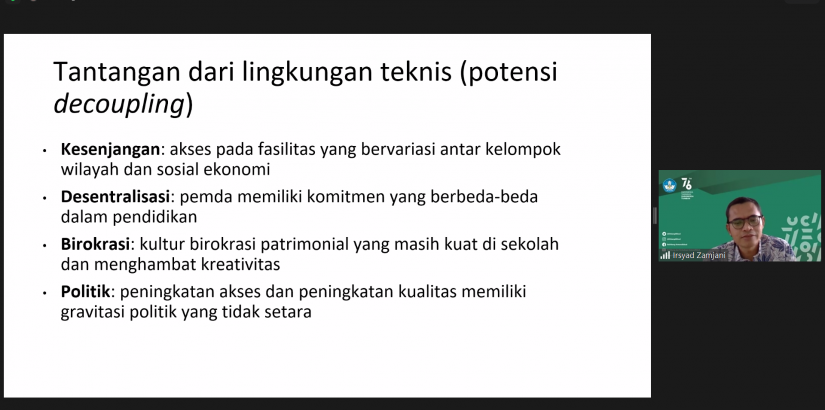
Yogyakarta, September 17th 2021─Issue in the field of education has become close to the people. Moreover, there are many criticisms that point to the governance of education in Indonesia. This phenomenon has become a topic of discussion in the #1 Sociology & Social Policy Public Lecture Series with the title ‘Political Education in Indonesia: Long-Term Vision and Various Dilemmas’. This event was organized by the Master’s Degree Study Program of the Department of Sociology of the Faculty of Social and Political Sciences UGM on Friday (17/9) at 10.00 WIB through Zoom Meeting. On this occasion, Irsyad Zamjani, PhD as the Head of the Center for Policy Research of the Ministry of Education, Culture, Research, and Technology was present as a speaker, and Desintha Dwi Asriani, PhD as a Lecturer in the Department of Sociology as a moderator.
In her opening, Desintha conveyed about the current issues in the field of education. According to her, education can properly address the challenges of social justice, which is not only empowering but also a solution.
The speaker on this occasion, Irsyad Zamjani, PhD, delivered material on the Politics of Improving the Quality of Education in Indonesia. Through his presentation, Irsyad explained about the position of education, which is one of the most important public policy sectors in Indonesia. “This sector covers early childhood education to higher education. Besides being broad, the stakeholders are also many and varied,” Irsyad explained, who earned a PhD from Australia National University. Education in Indonesia can also be seen using the theory of neo-institutionalism. In Irsyad’s observation, education in Indonesia has undergone changes caused by socio-political changes, developments in discourse and science, as well as global practices. This also changes the institutional aspect, but still needs a stronger push to change the practical level.
“Now, the education sector is also suppressed by the industrial revolution 4.0 and 21st century skills discourse,” Irsyad said. This narrative then elicited several responses from institutions, one of which was the Merdeka Learning program. Various challenges also emerged, such as inequality, decentralization, bureaucracy, and politics. As a policy maker, Irsyad said he was optimistic in responding to these challenges. In closing the session, Irsyad said, “We have many reasons to be optimistic. Education is the concern of many parties, so that improvements can be made collectively by the central government, regional governments, the private sector, and the wider community. What needs to be considered is how to organize these various initiatives to improve the quality of education”.
